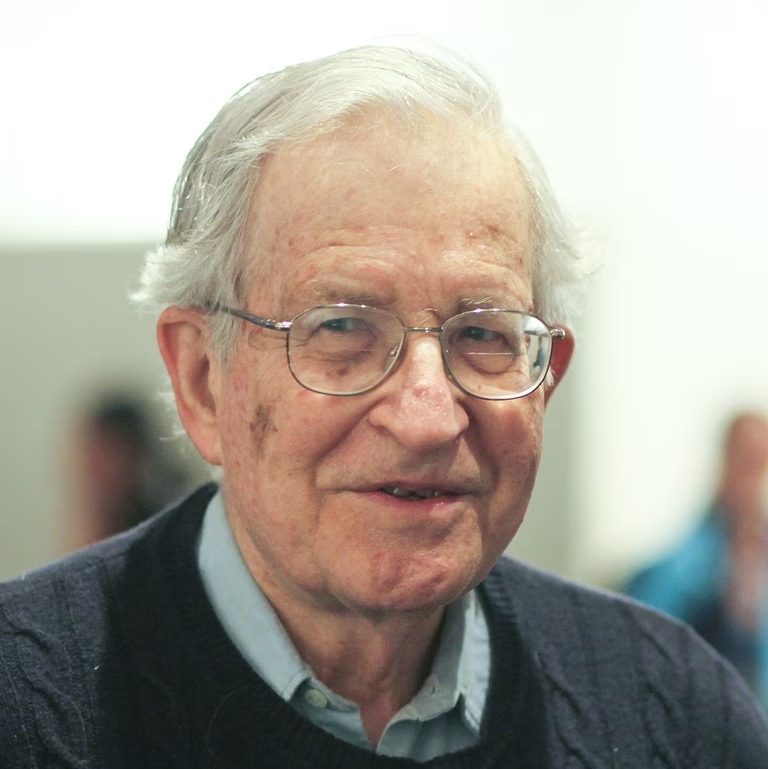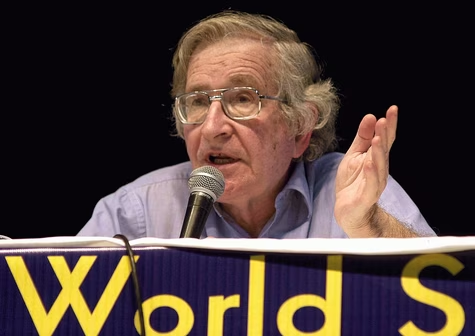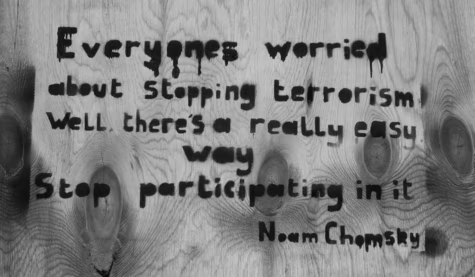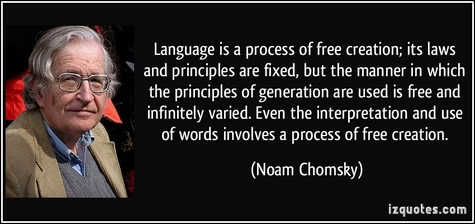
Noam Chomsky (USA)
Unique resource featuring the remarkable Noam Chomsky - Widely respected critic of U.S foreign politics, economy, consumerism and mass media.

➡️ NOAM CHOMSKY – Father of Modern Linguistics & Key Intellectual Figure within the Left Wing
Noam Chomsky is a renowned American linguist, philosopher, historian, political activist, and advocate of libertarian socialism. Throughout his 60-year career, Chomsky has become one of the most cited scholars in modern times. His work has profoundly changed the way we think about language, particularly through his theories of generative grammar.
Beyond linguistics, Chomsky has contributed invaluable insights into the analysis of our political systems, the media, capitalism, and U.S. foreign policy. He is a fierce advocate for social justice, democracy, and individual freedoms. His works have had a profound impact on both academic and public discourse.
*****
Jump straight to our resources on ➡️ Noam Chomsky
Explore our comprehensive guides on -
- Noam Chomsky's Work
- Must-See Videos & Articles
- Fight the Oligarchy
- U.S. Foreign Policy - Analysis
- Critical Comment on Corporate Media
- Press Freedom & Freedom of Expression
- Anarchism & Socialism
- Guide to Social Justice
- Peace & Nonviolence
"Optimism is a strategy for making a better future. Because unless you believe that the future can be better, you are unlikely to step up and take responsibility for making it so." - Noam Chomsky
*****

Chomsky's Contributions to Linguistics
Linguistics is the scientific study of language. Chomsky dedicated the early part of his career to studying the rules of language and the unique ability of humans to produce and comprehend language.
Chomsky's most groundbreaking idea is that all humans are born with an innate ability, or mechanism, to learn language, regardless of the country they are from or the language that they will speak.
Noam Chomsky's theory that language is an innate mental capacity questioned everything we previously believed about the behaviourist theory. The nativist approach, for the first time, explained the incredible speed at which humans learn languages and our linguistic creativity.
Chomsky has published more than 100 books, but 'Syntactic Structures' (1957) stands out for its enduring influence. It introduced the theory of transformational-generative grammar for the first time, and shifted the focus from behavioural aspects to cognitive processes.
His ideas have shaped the field of Linguistics far more than any other single individual and laid the groundwork for modern linguistic theory. The theory on humans' innate capacity for language is still debated to this day. Leaving this task to his peers, Chomsky has, in recent years, shifted his focus to political activism.

Chomsky on the Media
In his book 'Media Control: The Spectacular Achievements of Propaganda', Chomsky explains how typical news coverage filters out some stories while emphasising others to push dominant narratives. Monopolistic control over the media easily allows for systematic propaganda and censorship, which is used to serve the interests of the elite. The mass media serves merely to divert people's attention to less serious affairs, such as professional sports and celebrities, so that those in power can 'solve' the important issues.
Chomsky's media theory, or "propaganda model," asserts that the information disseminated by mass media is not always a reflection of truth but rather filtered and shaped by various factors -
- OWNERSHIP - Mass media firms are usually part of huge conglomerates. They are concerned only with profits. It is therefore in their interests to push for whatever stories guarantee that profit. Critical journalism does not sell and is sidelined.
- ADVERTISING - Media costs a lot more than consumers will ever pay, so advertisers fill that gap. Advertisers pay for audiences, we the readers, so the content needs to appeal to us.
- THE MEDIA ELITE - Governments and corporations know how to play the media game, influence the news narrative, and make themselves critical to the process of journalism. They feed the press with scoops, official accounts, and interviews with 'experts', making those in power and reporters reliant on each other.
- CENSORSHIP - When the media, journalists, and whistleblowers challenge those in power, you can guarantee that everything will be done to silence and censor this type of reporting. When the story is 'inconvenient', it is often discredited, subject to character assassination, framed negatively, and hidden behind other, more exciting stories to divert attention.
- THE COMMON ENEMY - To shape public opinion, you often need an enemy. This rallies people together and changes public discourse. Filling our minds with fear allows justification for inhumane acts such as military campaigns, war, weapons stockpiling, and strict policies on migrants and protest groups.

Chomsky the Political Activist
Chomsky has always had a deep interest in the political world, but it was not until 1964 that he became publicly involved. The U.S. invasion of Vietnam compelled him to speak up in protest. In "The Responsibility of Intellectuals" (1967), he presented evidence of multiple occasions when those in positions of power, including well-respected journalists, failed to tell the truth or deliberately misled the public to conceal the true motivations behind the United States' involvement in the Vietnam War.
This is just one example of the U.S. exerting its military dominance to gain economic control over an ever-larger area of the developing world. To sell this idea to the public, the powerful must make them believe that economic control in the hands of a tiny few is in their own interest - a task that, regrettably, has proved remarkably easy.
Alongside economist Edward Herman in "Manufacturing Consent," he provided evidence of selectivity, data skewing, filtering and censorship, corporate influence, and pure fallacy in regard to U.S. foreign policy and domestic politics.
Chomsky's profound contributions to political thought include the critique of power structures and exposing the systems that perpetuate inequalities and injustices in societies around the world. He is committed to ensuring citizens have the information that they need to come to their own conclusions and to make their own informed decisions about such important issues.
Standing firmly on the left of the political spectrum, his main concerns are U.S. foreign intervention, the spread of neoliberalism, capitalism, and militarisation. Chomsky has been an outspoken voice for peace and reason in the Israeli war on Gaza. His work has inspired many in the anti-war and social justice movements.
*****
Other notable works by Chomsky include Hegemony or Survival (2003), How the World Works (2010), Occupy (2012), Who Rules the World (2014), On Anarchism (2005), On Palestine (2015), and most recentlyThe Myth of American Idealism (2025).
'The general population doesn't know what's happening, and it doesn't even know that it doesn't know.' - Noam Chomsky.
Author: Rachael Mellor, 28.10.25 licensed under CC BY-SA 4.0
For further reading on Noam Chomsky see below ⬇️
Info on Noam Chomsky (USA)
- Info on Chomsky 35
- Chomsky's Work 35
- Chomsky Videos 37
- Chomsky Articles 49